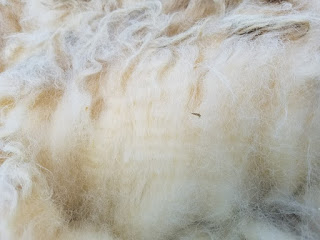I've known since I began knitting that I wanted my own sheep one day. I decided to take a wool spinning class to see if I'd like that part of the process. I wasn't surprised at all when I found that I really enjoyed spinning. For a few years off and on I would use a drop spindle to spin singles of my dog's hair. I hadn't gotten to the plying portion of the class and life happened so I just kinda played around waiting for the day that I'd get my own wheel. Once I did get my wheel I was terrified and didn't touch it for a year after an initial attempt at spinning the free fiber sample that came with it.
 |
| BlueLips in her coat |
 |
| Purl and Rosie coated |
 Once I spun up a bunch of free fiber I got from a local knitting shop that had to close it's doors I was hooked. I watched youtube and learned to ply it and set the twist etc... I made my first skein of yarn and never looked back.
Once I spun up a bunch of free fiber I got from a local knitting shop that had to close it's doors I was hooked. I watched youtube and learned to ply it and set the twist etc... I made my first skein of yarn and never looked back. It took a few years to get to a place where I could keep sheep financially and to have the barn and fencing to do it. During that time I learned a bit about different breeds, and wool. I spun the wool that came from the breeds I was interested in that would do well in the climate here in Wyoming and decided that for the first sheep I got I wanted fine wool and that I would not worry about whether or not they were purebred or registered. I found three local sheep, two black CVM x Merino cross yearling ewe twins that I named Purl and Rosie and in order to keep them on an even keel I picked out a strong smart 4 year old long wool cross Ewe. BlueLips was the name her shepherd gave her. It stuck, her lips are "blue" (basically like she ate some grey lipstick).
I learned that if you coat your sheep the fleece stays clear of vm or vegetable matter (hay, burs etc...) which can make processing the wool for spinning harder. This in turn gives the fleece a better value in general, higher prices. I purchased a few coats as the ones that were given to me with the sheep by that time had already become too small for the wool they were growing underneath. I changed coats for them a total of three times and each time I'd sneak a glimpse of what they were growing underneath. Even those little glimpses was nothing compared to what they were like once they were shorn and the fleece could be seen as a whole. WHAT BEAUTY!!!
 |
| Sunset shearing |

 |
| Tired Kiddos |


I watched a few videos about how to skirt a fleece and as soon as I had time and a calm day came along I skirted the fleeces. I could not wait to get my hands on them!
BlueLips:

 |
| Rolled lengthwise ready to be rolled up and bagged |
Purl:
 |
| Showing Crimp. The color was hard to get this close up |
Rosie:
 |
| All rolled up ready to be bagged! |
Shearing was in May, the county fair wasn't until August so I had to put the wool away and basically pretend it didn't exist till the end of July! It was a little torturous. To show your fleece it must be skirted (all the dirty edges, second cuts and shorter areas like the neck etc... removed) and then you take the fleece and fold the edges in toward the center, folded in thirds and roll it up and place it in a clear plastic bag. Each show is a little different in presentation as far as bag color goes but the skirting and folding/rolling of the fleece is the same for all shorn fleeces. To my great surprise and even greater delight BlueLips took Grand Champion at the County fair. I didn't think she'd do too great because she really is a heinze 57 of breeds. She doesn't have coarse wool but it's long, 8"-10" and without a tight crimp or curl to it. There's also a good bit of sheen, really lovely for a hand spinner that likes to work with the more medium type wool. They really loved her wool though. Purl got Second for colored wool and Rosie's fleece took first and reserve champion colored fleece. All very respectable showings for my first year keeping sheep etc... I was certainly pleased. I sent BlueLips and Rosie's fleeces to state fair they got third and fourth ribbons respectively.
 |
| All of my Fiber arts and wool fair entries tagged and ready to go |
 |
| Fair entries after county and state fair |
Quite an exciting year it has been!
Coming up: Wool Prep to keep the lock intact.








No comments:
Post a Comment